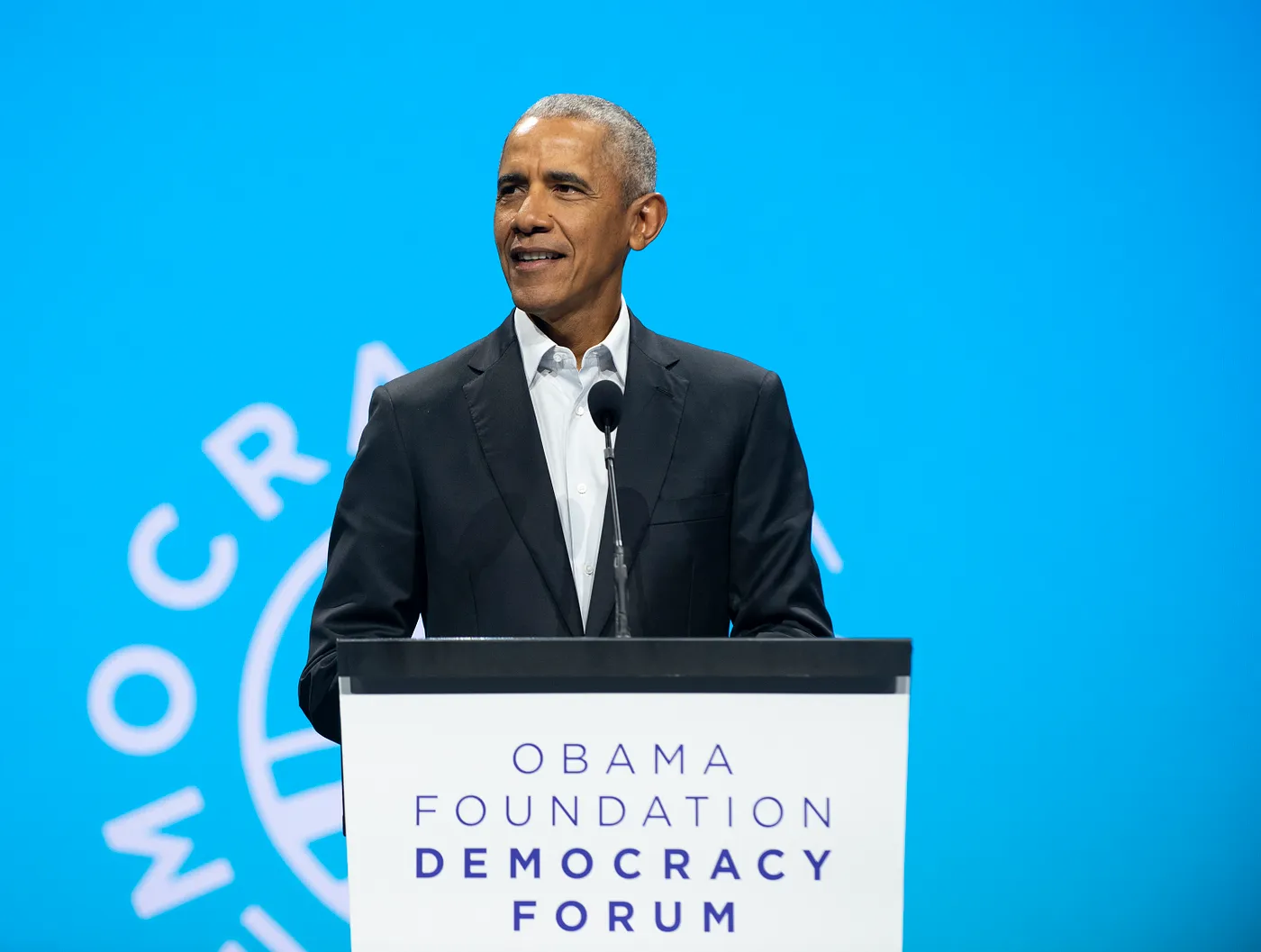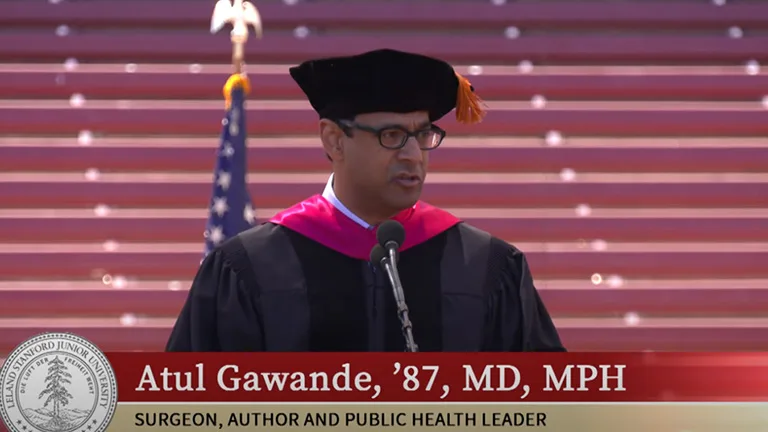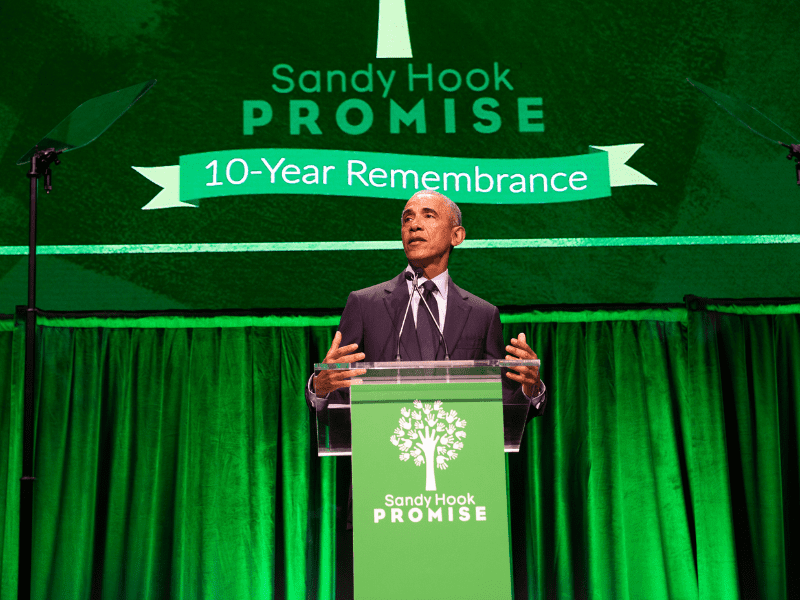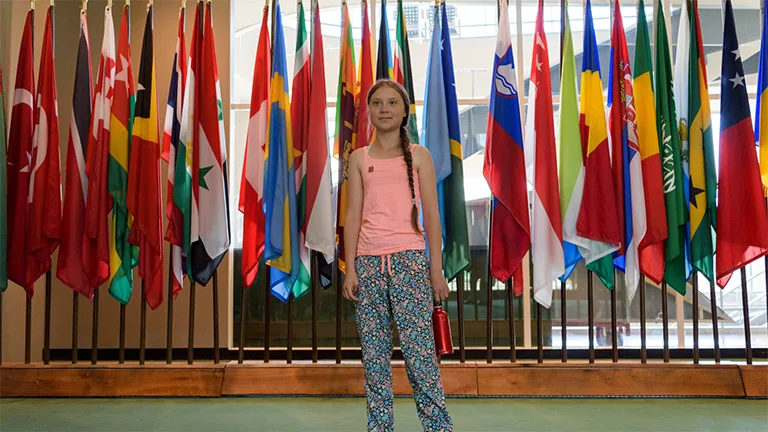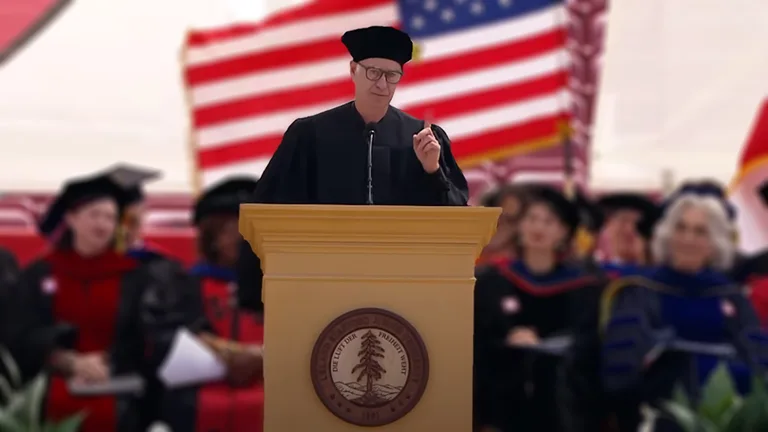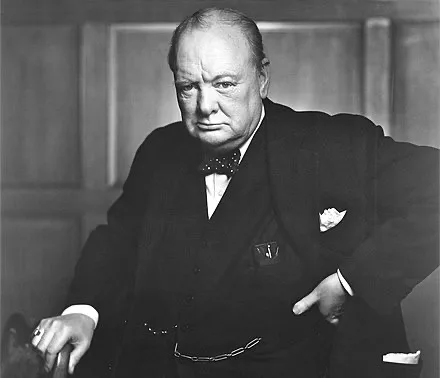Obama’s Speech and Remarks at the Obama Foundation 2022 Democracy Forum
Source: Barack Obama’s Medium Blog
November 17, 2022 in New York City
Good afternoon, everybody. And thank you, Gift, for that rousing introduction. He was getting me fired up backstage, getting me excited. And thank you, more importantly, Gift, for all the work that you’re doing to get young people involved in preserving and improving democracy.
And I want to thank all of you, the panelists that we just saw. I was backstage watching the panel on an inclusive economy. I told them, I am such a policy nerd, I was listening to everything, and it was scintillating and enlightening. And so, I’m grateful for all the panelists that we’ve had.
I want to thank our partners at Columbia University, my alma mater, and the University of Chicago, where I taught law for a decade. I want to thank them for being part of the inaugural Obama Foundation Democracy Forum.
Now, since its inception, our Foundation’s mission has been to inspire, empower, and connect the next generation of change-makers, and most of you in the audience fall in that category. We now have a global network of thousands of leaders, not just here in the United States, but in every corner of the globe, in Europe, in Africa, in the Asia-Pacific region, in Latin America.
They’re entrepreneurs and elected officials, nonprofit leaders and grassroots activists, artists and journalists and educators, all of them tackling some of the most vital issues of our time, from climate change to income inequality, from efforts to reduce racial and ethnic conflict, to efforts to expand opportunity for women and girls.
I just have to say, the determination and the passion of these leaders, many of whom are here, are already making an impact, in lives saved, environments restored, children educated. Many of you are creating new models for clean energy generation, new ways of thinking about poverty alleviation, and it is inspiring. It’s a little humbling, because I really didn’t have my act together like you guys did at your age.
And the good news is, we’re just scratching the surface of what’s next, what this next generation is capable of. In fact, today, I’m happy to announce that because all of you have shown what’s possible, because of the consistently high interest in our programs, we will be launching a new and expanded Leaders USA program in the coming months that can help more young people put their idealism to work.
Now, one of our goals is to create a community and shared platform for these emerging leaders so they can learn from each other and share best practices and form strategic partnerships across issues and across borders.
And one thing that’s become obvious in these conversations is that progress on so many of the issues that they are fighting for is linked to a broader commitment to democratic values, a belief in the dignity and worth of all people, a belief in rule of law and the accountability that comes from representative government, a belief in human rights and the free exchange of ideas.
And, as I know has been noted in many of the conversations that have already taken place today, these democratic ideas are currently under assault around the world. We see a manifestation of it in the unjustified and brutal war in Ukraine. We see it in the backsliding that’s taking place in what were well-established democracies. We see it in the escalating polarization and disinformation that’s so evident in recent elections, whether it’s in Brazil, the Philippines, Italy, Sweden, right here in the United States.
And let me be clear here, the threat to democracy doesn’t always run along a conservative/liberal, left/right axis. This has nothing to do with traditional partisan lines or policy preferences. What we’re seeing, what’s being challenged are the foundational principles of democracy itself, the notion that all citizens have a right to freely participate in selecting who governs them; the notion that votes will be counted, and the party that gets more votes, wins, that losers concede, that power is transferred peacefully, that the winners don’t abuse the machinery of government to punish losers, and entrench themselves, and make it impossible for other parties to compete in future elections; the notion that judiciaries should be independent and that nobody’s above the law, and that our political debate should at least aspire to be rooted in facts and logic, rather than fabrication and propaganda.
So that’s the reason for this forum. We’ve had big gatherings, particularly before the pandemic, of young leaders before, but we wanted to sharpen our focus on what’s happening. We thought it was time for us to sharpen our focus on what’s happening to democracy today.
And in what we hope will be a regular event, we want this gathering to bring together some of the remarkable young leaders in our network, young people like Gift, with some of the top thinkers and practitioners in the field, so we can take a hard look at the trends that have put democratic pluralism on the defensive, to see if we can start developing the tools to rebuild a stronger democratic culture, and a more durable set of democratic institutions for the future.
Now, you’ll be surprised to hear that we probably won’t figure this out in the next 48 hours. The reasons for democratic backsliding are complicated; they are varied. Globalization, and unprecedented technological change have disrupted long-standing economic and social arrangements in every corner of the planet, and at head spinning pace. And that’s brought or exacerbated growing inequality.
You’ve got a warming planet, and violent conflicts, and that has helped trigger more and more instances of mass migration, creating changing demographics and cultural conflicts.
There’s the reemergence of China and India and other countries as global powers. And so, we see a multipolar world that can escalate into ethnic-based nationalism.
And, of course, we’re in the midst of an information revolution, much of it, which is built on commercial platforms that find controversy and conflict more profitable than tolerance and truth.
So there are a lot of factors that are weakening the foundations of democracy, and in this inaugural forum, we’ve identified a few of these issues to start digging deeper.
First, how can we create, as you just heard in the previous panel, a more inclusive and sustainable model of capitalism so that people feel they’ve got real economic opportunity and have a stake in the forces that govern their lives?
Second, how can we reimagine both our traditional and social media platforms to curb toxic disinformation and encourage a healthier exchange of ideas?
And the third question and the subject of this panel is, how can we strengthen the forces of pluralism in an increasingly diverse world? And as tough as the other questions are, this one may be the toughest because it doesn’t just involve fixing the mechanics of elections or putting the right economic policies in place. What makes the topic of this panel tough is that it raises basic questions about culture and values and identity.
And a lot of times, those of us who are interested in democracy promotion, have tried to wish away the so-called culture war questions. We like to focus on rules and law, and policy and calculations. And we tend to see politics and governance as this constant negotiation between competing rational, self-interested actors.
But that’s not how most of us experience the world. We may operate on the basis of very concrete material interests. We need to have our basic needs met, wanting higher wages, affordable housing, health care when we get sick, security in our old age. All that’s important. But we also care deeply about having a coherent story about who we are and our place in the world. We care deeply about a sense of identity and a sense of belonging and a sense of status, a sense that our lives means something, and that they have a higher purpose.
And long before democratic forms of government became widespread, most people around the planet found answers to these questions in traditional social networks and institutions. And guess what, the majority of people still do. We find identity and meaning in family and religion, in tribe and in nationality, in our occupations, in our language, our customs, in gender roles, in our geography, our sense of place.
And democracy is not supposed to eliminate these vital sources of connection. Instead, the pluralist idea, at least, assumes that each of us are born into different communities with different loyalties and traditions, identities that are shaped not just through our families, but through mediating institutions, like religious bodies, or ethnic and civic associations, and unions and professional organizations, regional affiliations.
And so, then these diverse communities are supposed to come together as a national community under an agreed-upon set of rules, maybe a constitution. And these diverse communities are the building blocks for political parties. And that’s how people pursue their interests and form alliances, and then they negotiate and horse trade on a bigger stage. That’s the theory anyway.
Now in practice, we know that such an ideal conception of democracy often worked in a lot of countries, and often still works by excluding certain people and communities from power. Those people, the out groups, were silenced, or they were rendered invisible, or otherwise subjugated because of race, or gender, or religion or ethnicity.
And one of humanity’s greatest achievements in the modern era has been the recognition of this injustice, a commitment to ending notions of caste, an insistence that for any genuine democracy to function, all people need a seat at the table, not just ethnic, racial, and religious minorities, but also women, and members of the LGBTQ+ community and people with disabilities.
And as uneven as that progress has been, just the fact that that ideal has taken root in so many places around the world, that is powerful. That is remarkable. And that’s happened basically in my lifetime. And I’m not that old. As I remind my children.
But that progress makes democracy a whole lot more complicated. For one thing, it’s easier for people to agree on stuff when the majority of people look the same and worship the same way and share the same traditions. It’s harder as societies become more diverse, and everybody is at the table.
Second, people who are accustomed to being at the top of the pecking order, people whose identities in part have been shaped by a sense of the privilege and power of their group compared to these other groups, well, they’re likely to feel their status in society is threatened when the existing order goes through rapid changes, and politics starts feeling like a zero-sum game; your gain must mean my loss.
And third, what’s thought of as important in upholding traditions for one group, for example let’s say segregation of the sexes at religiously affiliated institutions, that may feel to another group, understandably, like a violation of their rights. And in such circumstances, politics may no longer feel like just a way to divvy up the economic pie or figure out the best way to build roads and schools, the kind of stuff where we feel comfortable compromising and splitting differences.
Instead, it now starts feeling like our core values, and our identities are under assault, and that not only our political opponents, but our governing institutions and even democracy itself are the culprit, that the game is rigged, and they’re out to get us.
Now, you mix in the fact that the spread of modern global capitalism really has often ruthlessly reorganized work and disrupted communities and rewarded individual mobility over cooperation and solidarity, people are moving around, extended families don’t see as much of each other. Membership in mediating institutions steadily decline, people feel more isolated than ever, and pretty soon, genuine communities with all the richness and complexity are replaced with virtual communities that narrow our conceptions of who we are, and what’s important and who we’re connected to.
And online media encourages this, since you’re more likely to click onto sites and read messages that reinforce your preconceived notions. And the people who are most active on social media tend to be the ones who are most controversial and emphasize their differences with other groups. That’s what gets attention.
And of course, politicians learn, or relearn because they’ve known this for a long time, that one of the easiest ways to win votes is to tap into people’s growing sense of anxiety and fear and vertigo, their sense of loss, their resentment of change, and to tell them that their tradition and their values, their very identities are under attack by outsiders, by them, whether it’s foreigners, or immigrants, or gay people, or cosmopolitan elites.
And you add it all up, then you’ve got a recipe for backlash, and polarization and the sort of toxic slash and burn, “anything goes” politics that we’ve seen erupt just about everywhere. And it is dangerous because like it or not, diversity is not going away. The claims of the previously excluded are not going away. We’re not going backwards 50 years demographically. And history tells us that when our identities are reduced to a single characteristic, our race, our sex, our nationality, our tribe, conflict follows.
So we’re going to have to figure out how to find overlap, and a sense of multiple identities, and we’re going to have to figure out how to live together, or we will destroy each other.
So what do we do? As you might expect, I’ve got a few ideas. I promise not to go into too much detail here. One thing I do know, rather than shy away from these cultural questions, we have to take them head on.
I believe those of us who believe in democracy have to acknowledge the anxieties and frustrations that rapid economic and cultural and demographic changes have brought, and we have to find a language, a story of how we can affirm the best of traditional values in our respective countries or respective communities. We have to create a space for our differences, while insisting that our politics and our governmental institutions uphold the overarching principles of equality for all people.
I think we have to rebuild healthy mediating institutions, worker organizations, civic associations, religious associations, trade groups, both in the real world and the virtual world, and they need to be adapted to how we live today. And they have to operate from the bottom up, and we have to find ways of bringing people from different backgrounds together in these groups, so we can all develop better habits of listening to each other, and debating each other, and making group decisions together for the common good.
I think we’re going to need to expand the civic education that we provide our children, and we have to make it hands-on and relevant, so they can practice the skills of citizenship.
And I believe we have to find ways to harness the power of information technologies, whether it’s through better industry practices, government regulation, innovative new business models, so they promote more trust and cooperation, and less anger and fear.
None of this will be easy. Renewing our democratic culture will take decades and not years. And that is why the ideas of a 61-year-old ex-president are less relevant than the ideas and insights of a new generation of leaders who are better attuned to the changes that are taking place around the world, and by the way, will be the ones that carry democracy’s torch into the future.
So I’d like to bring a few of those leaders up to the stage right now, so you can hear about the work they’re already doing on this front.
Please welcome Doussouba, Landi, Nick, and Natalia.
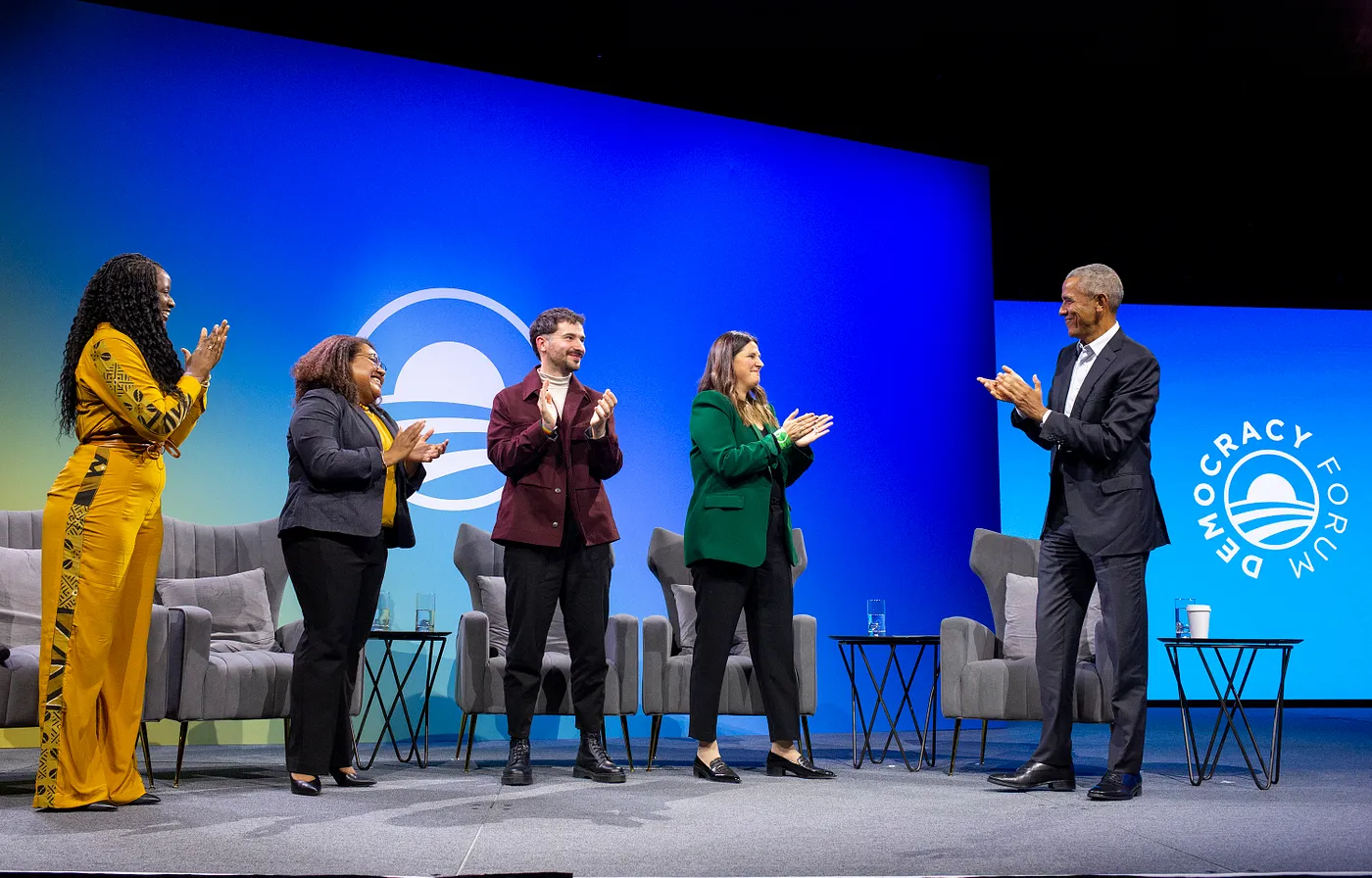
I’ve been following the outstanding work that these young people do, but not all of you may know about what they’re doing. So I want to start by making sure that each of you introduce yourself, where you’re from, and describe a little bit about the work you’re doing.
And since our time’s limited, I’m going to tack on a question on top of it. When you think about your generation, you think about young people that you interact with, you work with, you’re organizing, you’re mobilizing in your respective communities, countries, how are they thinking about democracy? Are they cynical about it? Are they confident about it? What’s the general take of younger people around what’s possible with respect to democracy?
And that’s an open-ended question purposely so that you can just take it where you want, and we’ll start with you, Natalia.
NATALIA HERBST: Thank you very much.
My name is Natalia Herbst. I’m from Buenos Aires, Argentina. I’ve been working in government for the last 10 years, both at the local and national level, mostly in the field of social development, with a focus on youth and reproductive rights and civic engagement. And based on that experience, I currently advise the government of the city of Buenos Aires.
I love that question because based on our work at the National Youth Institute in the past, we’ve done a lot of research trying to understand how young people shape their views on democracy.
And one thing we’ve learned is that over half of them, 68% of them are not happy with how democracy is working. But they also feel that by voting and being engaged in social and political causes, they can change their realities.
And a worrying thing in this sense is that the avenues that they are finding to actually do it usually are separated from political parties, which is good in the sense that it means that democracy is creating a lot of spaces for participation, but it also creates more space for populist discourses to hold during elections.
I think another main takeout from that research that we did is that we learned that young people currently don’t trust traditional politics. They see it as a space in which zero-sum games are played, instead of collaborative processes to create progress. And in shaping those views, economic background matters a lot.
In disadvantaged contexts, grassroots organizations and political parties are valued at 60% and 40% more than in middle classes. And this is mostly related to the role they play in creating a sense of belonging, but also in their link to securing livelihoods and subsistence.
So an unintended effect of democracy has been a dual experience of civic engagement. For middle classes, civic engagement represents a way of activism, of self-assertion, of reassuring their values. And in under-served communities, this is directly linked to securing livelihoods and basic needs. And that means that currently, inequality is not only affecting opportunity, but also how young people experience democracy and its institutions.
PRES. BARACK OBAMA: Nick?
NICK ANTIPOV: Where should I begin? Of course, I was born and raised in Minsk, Belarus. It’s near Europe and Ukraine.
I was building, as an LGBT, as a queer person, despite the authoritarian regime, which we were living, I was building a confidential community, a safer space for people like me, for people who face discrimination.
At the same time, I’m here like, when I’m hearing your story, when you mentioned about carrying an identity identity, I’m here also carrying like multiple identities. I’m also asking myself, what kind of story do I want to tell? I’m a Belarusian. I’m an LGBT+ person. I’m activist. And I’m already a political exile.
Now, since I cannot live in Minsk, but I’m living right now in Berlin, I decided that, like I lost everything. I lost my community. I lost my family. I cannot go home back. I made this one of the difficult decision in my life last summer.
But I don’t know. Suddenly, I decided that I think I should be going. I have this feeling, which all Belarusians have these feelings right now, this longing for democracy. We’re struggling in our country.
And I’m continuously helping my community who are struggling in Minsk and Belarus. I am helping LGBT+ activists to empower themselves and build their capacity to continue. This is my part of the job right now.
PRES. BARACK OBAMA: Landi?
LANDISANG KOTARO: Good evening, everyone. My name is Landisang Kotaro but call me Landi. When you say Landisang, I feel like I’m supposed to say, sorry, because it comes with a scolding. But first of all, my name is Landi. I’m from the Republic of Palau. And I believe that at the heart of democracy is love and service.
I have been fortunate that twice in my life, I’ve experienced the beauty of democracy, first, as an eight-year-old girl, singing the national anthem in a baseball stadium, witnessing the island of Palau become an independent country.
And the second one, Mr. President, I was a student at the University of Utah, and we’d drive on the weekends, getting into stranger’s cars, believing that we were working for change. And I canvassed for you in 2008 in Breckenridge, Colorado.
PRES. BARACK OBAMA: I should point out; I did not know this. That is not why she’s here. But I do appreciate it.
LANDISANG KOTARO: I don’t vote for America, but what happens in America has great impact in the rest of the world, especially Palau. And I believe that the change that Mr. President Barack Obama was able to bring was going to be positive for our country.
The current work that I do now is I am Chief of Staff to President Surangel Whipps of Palau, and he sends his regards. I need a paycheck, guys. Just kidding.
But I truly believe that it’s in these types of forum that we get an opportunity to network with one another. We’re in a very interconnected world, and if we believe democracy to be of love and service, it’s love and service of people. It’s not loving service to floors and ceilings. It’s love and service to people. And it’s through relationships, through connecting, we can actually effect that change. Thank you.
PRES. BARACK OBAMA: Doussouba?
DOUSSOUBA KONATÉ: Hi. My name is Doussouba. I’m from Mali in the heart of the Sahel. I’m currently running a civil society organization called Accountability Lab. And the goal is really to push for accountability, to push for governance, to push for transparency, making sure that people can actually come together and find solution to the different issues that we’re facing.
Sahel is going through a rough path right now. I’m originally from Mali. We’re sharing borders with Guinea, with Burkina Faso. And all of the three countries have been the theater of military coupe those past two years. Actually, in the past two years, those three countries had five military coupe directive.
I want to say that I don’t think that the population or the youth is wanting to have those military coupe, but I think that we’re living in such condition that actually kind of created in a way, that created those military coupes.
I mean, in the sense that, and I am going to give like a specific example, I’m going to talk about Mali more specifically, because in 2020, we have seen amazing, like, massive protests in the streets of Bamako, like population, all people, young people, the mother, absolutely everyone protesting against the government simply because there’s a failure of social contracts, in the sense that the population is not having access to their basic needs.
And when I’m talking about basic needs, I’m talking about security, because there is right now a conflict in the northern part, in the center area. And this conflict is actually not just in Mali, but it’s also in Burkina Faso and in Niger.
So not only people couldn’t have security, but there is corruption also, which is creating so many exclusion, people were not included, people were not having access to economical opportunities. And the list goes on. There’s different issues that actually led to those military coupes.
Right now, we’re in a situation where a part of the population is actually supporting those military coupes in the sense that it appears to them that this is actually the strongest institution, simply because the government has not been able to provide for them.
And I think that in my country, and in Burkina Faso, and in Guinea, the democracy didn’t work through the ballots. Actually, democracy has been heard in the streets, through those protests, through those massive protests.
Nevertheless, I think that despite those multiple issues that we may have that we are currently undergoing, the youth is actually really expecting a generation of leaders that will step up, that will work with integrity, make sure that people can have access to the basic needs.
But I think that something that is actually pushing away, pushing us away from democracy is that when we see that the democratic processes are not respected, that the rules are being broken all the time, and that we have a corrupt elite that is capturing all of the resources. And I’m talking about the power, the political power, I’m talking about economical resources.
So I think that those are the kinds of things that kind of make us question ourselves, and kind of saps the energy or the faith that we may have towards democracy. Thank you.
PRES. BARACK OBAMA: Terrific. Obviously, each of you come from vastly different countries with different conditions. And it’s always dangerous for us to generalize the way I just did in my speech about talking abstractly about democracy and broad global trends when each country is going through very specific issues.
Natalia, as you pointed out, even within countries, how people think about democracy may be different. For more secure, middle class, young people, they may view this as an exercise in pushing for their ideals, their principles, grand conceptions of how society should be. For folks in need, it may just be a more immediate interest in is the government working for me, regardless of what we call it.
In a place like Belarus, issues of freedom and democracy are much sharper, because you’ve had an authoritarian government there for a long time.
And in a place like Palau, Landi, as you pointed out, how democracy works in larger nations may have as much impact on the ability of a democratic government in Palau to deliver for its people as what the government itself is doing, right?
Everybody’s in different situations, but I do think it’s useful to show that there’s a throughline between your experiences, and that is that when government isn’t working, there are two responses. One is to give up, and maybe say, okay, there’s a strong man. There’s a military. There’s somebody who can bring order to the situation. Alternatively, you can respond by saying, we, together, are going to make it better through persuasion, and through voting, and through organizing. And which choice people make, that’s a pretty important choice.
What I’m interested in as you do your work, what do you find works to persuade people that it’s possible to take the path of persuasion and non-violent change? And what turns people off where they say, oh, you’re a dreamer and this isn’t realistic? And maybe you can just give some specific examples of lessons you’ve learned in the work that you’re currently doing.
NATALIA HERBST: Well, in my case, it has been easier to do these through policy rather than politics. And that is not really surprising in Latin America, considering the low levels of support that political parties currently have. Their regional average is 13%. And in the case of Argentina, it drops to 11%.
The key for me has been sustained engagement, and as it has been said throughout the day, creating the opportunities for people to get to know each other, because once you put a face, and a name and a story to someone, to another that may have otherwise caused fear, there’s no going back to those feelings.
In our case, the most effective program we run in order to do that was a mentorship scheme that we developed with the private sector, in which volunteers were paired with young boys and girls that were about to finish high school, in order to work on setting goals and thinking about pathways to achieve those goals. And when we were developing this program, it was very objective oriented. And we were thinking about how do we support these young people who may come from homes, where there’s not the necessary experiences or social capital to support them through these journeys. We were thinking a lot about that.
But as we went through the program, year after year, we kept seeing a positive, unintended effect of this program in the mentors. These were people who were usually just minding their business and doing their work, and all of a sudden, were engaging with people and realizing that they had something to contribute to society that they hadn’t realized before. And they consistently gave us feedback, saying that they had also changed the way they understood livelihood different from theirs by participating in these exchanges.
I guess this is evidence about the fact that the way our communities are currently organized, compared to how they were a few decades ago, it’s very unlikely that people will engage with other people from their own communities whose lives are very different from theirs. But when this does happen, when these relationships happen, everything and everyone involved is transformed for the better. I guess the challenge is thinking, how do we recreate this at scale.
PRES. BARACK OBAMA:. So Nick, thinking about LGBTQ+ issues in not just Belarus, but in Poland, and in many countries in Central and Eastern Europe, where there’s still traditional resistance to recognition and rights, how do you think about these issues? And I should note that as we’re speaking here today, the United States Senate, a majority of the United States Senate, a significant majority, including 12 Republicans voted to move forward a bill that would create a national law ensuring the right to same sex marriage.
And that is a remarkable feat that happened in the span of maybe 15 years, which, in terms of social change, is really fast. But it’s not as if there weren’t similar sets of resistance here in the United States. And so, obviously, there are activists here who I’m sure you’ve learned from and talked to. What’s your experience as you are trying to broaden the reach of democracy in a place where there’s a lot of traditional resistance, as there was here in the United States?
NICK ANTIPOV: Well, of course, it’s amazing changes for this short period of time. I have my background, as you also, it’s civic activism, and I’m here talking as an activist.
Before I came to this panel, I was actually approached by a young, brave leader from America. And she said to me that it means the world for her to see me on the panel, representation of LGBT+ and queer community here. And I felt like such a bond with her; I remember when I was super young in Minsk, and she is in America.
And this is how we are living. Despite the fact, despite the laws, which are super important and super crucial, there is a lot of struggles. And I believed in Belarus, despite the authoritarian regime, we actually could do something. And we’re improving lives, ordinary people.
And democracy eight months ago, a new war started in Europe, like many of Europeans, I was in the bed that time. I remember how I woke up on the February 21st . My partner and I sat for I believe the worst of it. I was shocked; I was stunned. I felt this furious and the same time, like powerless. I had to German classes that day, but I decided to skip them because I couldn’t.
And I was approached by other Obama leader, who is a survivor of ISIS genocide 2014 with the idea, “Let’s make a platform where we can find a free accommodation for people who are fleeing the war from Ukraine.” And on the first day, we find a beautiful team of volunteers around the world. We connected them through online, and we built a platform. And we find it already helped like 3,600 families to find their place around the world. And this is only our story of our project. Civil society activist were assisting Ukrainians, while politician can only express their deeply concerns.
And democracy right now, we are seeing how democracy backsliding. And I heard, tomorrow morning, a panel about how we see how the rise in authoritarian regime. They are working together. They have a playbook; they have a toolkit how to keep going. And I believe that civil society organizations and civil society activists who are on the authoritarian regimes, we should work together.
And this is how we can achieve not only democracy in your country. My region is on fire, but don’t think that fire doesn’t touch you. Don’t think that who disregards human rights in Europe won’t disregard human rights in America.
I believe now, this world needs, like never before, needs responsible leaders who can promote democracy, protect, regenerate the planet. And I’m glad that I’m here today. I’m glad that I can share this panel with this amazing leaders, and I’m glad that I’m a part of this decision. And I believe this is how we can bring a democracy in our country.
We will be fighting. We will be fighting for democracy, and this is how we can achieve acceptance, inclusion, diversity. Yeah, and I believe this is a great moment of time of living.
PRES. BARACK OBAMA: Landi, obviously, Palau, one of the issues you’re dealing with is climate change. Island nationand with sea levels rising, you’re already seeing effects. And that’s a global issue, but you have to work locally. And a lot of your work is giving people a sense that if they get engaged, and they get involved, that they can actually see concrete outcomes. How do you think about it as you’re working with the President? What tools seem to be effective in mobilizing people and getting them to recognize their communal power?
LANDISANG KOTARO: That’s a great question, and I’m going to start answering the question by sharing that the President took office very much at the same time that President Biden did in January of 2021. That was during the COVID-19 pandemic. And it was on January 3, I believe that the first vaccines reach Palau shores.
As a show of confidence, the President, with the ambassador to the United States that was residing in Palau, were the first ones to take the shot. And there was campaigning, telling the people that they need to take the shot in order to be vaccinated, in order to protect themselves, in order to protect the community. And thankfully, the people of Palau, without being urged, without having to be incentivized, came in the masses and got vaccinated.
If we had that approach to the COVID-19 pandemic, because we knew that our economy was struggling, we went from 150,000 tourists to zero, our economy was really struggling on top of the already problems that we faced with climate change. People came in the masses, because they knew that this was a step in the right direction, and it could open up opportunities for all of us.
Why can’t we come together as the world to address climate change? We are at the forefront. I think there was lightning speaker earlier from Guam that shared that we probably have some of the least contributions to climate change. But we’re at the forefront of really feeling the impact of that climate change. And it really, when we say existential threat, it’s not just an anecdote to say, all my identity is going to be lost. But when islands really go underwater, who are you, as an islander?
There’s a girl from Kitava that’s in our cohort. If real from Kitava goes under water, she’ll be a girl from Kitava with a map from 10 years ago, showing that’s where my island was, living somewhere else. We really have to come together.
In Palau, Mr. President, I think you said it. Approach to democracy is not one size fits all. We have to go back to our cultures. We have to go back to who we are as individuals, and who we are as a collective. What are the values that we share, because it’s only in identifying our values that are similar to one another, that we can come together and really be innovative in those changes?
And sometimes, innovation and positive change is not something that we have to think outside the box. Sometimes, it’s going back to our roots. Who am I as a Palauan? What culture do I have? How did my ancestors survive? It doesn’t have to be like living off the land, which is probably a good idea because it’s organic food.
But it’s really going back to saying, what are the values? What were the fibers that wove the community together, going back to that believing in one another that what we’re doing is right, and doing it because we know it’s right, not doing it because you get a paycheck, not doing it because somebody else told you to, but doing it because you know it not only helps yourself, it helps the person next to you. And if we all took that individual responsibility, imagine where we would end up.
PRES. BARACK OBAMA: Doussouba, in many African countries, you were talking about the conflict, civil strife, military coups in my father’s country, Kenya. Historically, it’s been spared some of the worst of civil war. But like many African countries, a lot of these conflicts fall down along the ethnic fault line, right? And I’m wondering how much of what’s happening in Mali is spurred on or encouraged or made worse by ethnic division? And how much is that something that you have to think about in your work? And have you found ways in which you can get young people to work together across some of those divisions that have been there, in some cases, for many years?
DOUSSOUBA KONATÉ: Yeah, definitely. This is an issue that we are facing in Mali and some other countries, as you mentioned. I think that something that is really important and we’re trying to push that is really the positive narrative. I think this is something that is good for the mental health. This is something that we need, as a community, as a region, as a country, as a continent, just in general.
And so, what we do, because, yes, those ethnic backlashes or problem does exist, especially in the center area of Mali, where we are witnessing massacre of an entire villages, such as Ogossagou, for example, two years ago, where 150 people have been killed. And we talk about people who are 80 years old, or babies who are like six month. Again, I’m coming back to the positive narrative, because I think that we need to change that.
In my previous answer, I didn’t mention a lot of issues that we are facing. And I think that whenever we turn on TVs, whenever we hear something about the continent, unfortunately, most of the time, it’s negative. But God knows that on the continent, they are amazing things that are going. There are amazing people were doing an amazing job. And I think that we really need to really flip the narrative and focus on the positive things, because this is how we can inspire people, and really put the light on role models, show to the youth that this is possible. There are other ways to do things.
For example, in Mali, and in other countries around the world, we have a company that is called Integrity Icon. And I’m coming back on the subject of governance because for us, we think that it’s important to actually showcase the amazing work that civil servants are doing. Why civil servant? Because, again, we have those thoughts where we think that civil service, it’s all corrupt. They’re not doing their work. They’re just sitting in the office not doing anything. And there may be sometime, it might happen.
But I just want to say that they are amazing people who are doing an amazing job, and we need that. We need to have role model. We need to have inspiring people. We need to believe that it is possible to change. And we have to change our community. We have to change our region. We have to change our country. We have to change our continent; nobody will do it for us.
And I think that’s something, also, that is really important. We tend to put also a lot of focus, because we were talking about “we.” I think that “she” also is an important word. We try to put, also,a lot of focus on the woman, because, I mean, a woman is like 50% of the world, 50% of the population of the world. We need also more spotlight on amazing women that are doing an amazing things.
And I think that, especially in a country like Mali, and I’m just giving the example of Mali, but there’s multiple country who are living under the patriarchy, who are living in a patriarchy society, and we need to showcase amazing woman as ourselves.
PRES. BARACK OBAMA: Well, all of you are just getting a taste of the amazing work that all these young people are doing. And it’s always hard to do it in such a compressed time. I’m hoping that you all get a chance, during the course of the remainder of the forum tomorrow, to meet and have conversations, and learn more about the concrete work that they’re doing and the concrete results that they’re delivering.
I want to just give each of you a chance very briefly, because the clock’s ticking, one idea or thought that we haven’t mentioned around how we achieve the dream that Landi described of people working together. Obviously, it’s something that I’ve spent a lot of time thinking about during my life in public service.
At a time when we have so much information, and young people are distracted by so many things, is there one thing that we haven’t discussed that you think we should take away from this panel in terms of being more effective in bringing people together around the idea that democracy can work for them?
NATALIA HERBST: I want to pick up on what you just said about the young people being distracted.
There are so many young people and so many in this room who are already producing change. And I want to be self-critical with my sector, with governments. I think governments need to stop thinking about youth as the future and start seeing them as the present. They need to stop trying to teach them and start learning from them, if they really want to represent the generation that doesn’t feel represented by traditional politics.
PRES. BARACK OBAMA: That was not only a great answer, but a good role model of being succinct. Nick?
NICK ANTIPOV: Well, my last words will be I’m really fascinated by all what leaders around the world are doing. And I’m fascinated by what how we can, here, come together to share these ideas. I believe the new world must have this sustainable leaders, and we cannot achieve the full diversity and the full democracy only in one country. It should be in a different — and we should cooperate it together, like in Europe, like in America, like in Africa, like in Asia South Pacific and Latin America. This is how we should be done. Civil society should cooperate together.
PRES. BARACK OBAMA: Right. Transnational efforts are going to be important.
NICK ANTIPOV: And trans-local.
PRES. BARACK OBAMA: Yeah. Landi?
LANDISANG KOTARO: My brief answer will be in Palau and in the Pacific, we navigate by going in canoes. And you do not paddle the canoe by yourself. You paddle the canoe with other people. Make space for other people in your canoe, and you can paddle. You will go further.
PRES. BARACK OBAMA: Okay. As a Pacific Islander myself, I can confirm that canoeing on your own is tough.
DOUSSOUBA KONATÉ: I think that just to come back on the concept of democracy within the context of self, I think that democracy is not just election every four to five years, where people who are power holders actually engage with the population to get their vote. I think it’s really those power holders need to engage with the population throughout their mandate, not only to be to heard — to hear, sorry, their concern, but really to create space where people can actually engage, where they can listen to their concern, address their concern, and create that sense of ownership that will actually lead to more civic engagement, because democracy is not just a concept that is on the shoulders of power holders. It’s actually on the shoulders of absolutely everyone.
PRES. BARACK OBAMA: I hope all of you get a sense of why, even during bleak times, I’m still the hope and change guy, cause you’ve got amazing young people like this who, all around the world and throughout the United States, are doing great work. And our task, not just today or tomorrow, but for years to come, is find ways in which we can continue to support you and lift you up. And this has been a terrific start.
Thank you so much, everybody. Please give them a big round of applause.
